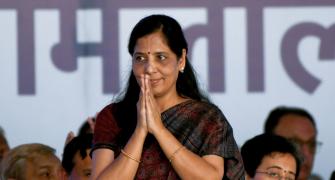While the centre of gravity of world affairs is moving to Asia, the prospect of sharpening inter-state competition over scarce resources is very much on the horizon, says a new book by noted security analyst Brahma Chellaney.
"There is a danger that inter-state conflict in Asia could in the coming years be driven by competition not so much over political influence as over scarce resources," states noted security analyst Brahma Chellaney in his book, Asian Juggernaut, Rise of China, India & Japan.
It is likely that China will trounce its competitors India and Japan for global resources by a distance. "Chinese government pursues commercial interests abroad just the same way the board of a large multinational company hunts for international opportunities," says the book.
Having already lost many bids for oil fields to Chinese companies in Africa and South America, the trend is likely to continue for Indian companies whenever they come in direct competition with them, unless India evolves an 'integrated energy policy tied to its foreign policy.'
Thought the book is titled Asian Juggernaut
it provides deep insight into the Chinese juggernaut that is likely to dominate future events in Asia. Chellaney says that while China is fully focussed on its way to become a world power, Japan or India, fundamentally, is yet to develop a clearly thought-out strategy and the grit to become one in its own right.
The book says that China's current drive to accumulate power is the single biggest contributor to geopolitical change in Asia, the future course pursued by the communist-ruled state will be principal determinant of Asian stability and security.
History, geopolitics and conflicting goals will continue to cast a shadow on the equations in Asia's strategic triangle. The book states that China will try to assert its role as Asia's 'natural leader' in due course and calls Japan and India to come up with their own responses to this challenge.
"For Japan, the challenge is to prevent the strategic balance in East Asia from changing adversely against its interests and India has just one credible option -- a single-minded pursuit of comprehensive national power," the book says.
Chellaney calls for rapid improvement in infrastructure, reform of labour laws and open competition in labour-intensive manufacturing. "If India is to be recognised as a major international power, it has to start behaving and acting like one," he says and calls for increase in defence expenditure and massive investment in defence research rather than depending on foreign countries for the same.
Few other major factors that will shape Asia would be the relationship of each of these three players with the United States, the historical conflicts, and future possible alignments.
"The increasingly vocal China-Japan feud, the not-so-veiled Sino-Indian rivalry and the growing concerns in Asia over China's rising power make the future course of Asian security uncertain," the book says.
Talking about India in China's strategic calculus, the book says that China is following a classical balance-of-power politics. "Hemming in India from three sides-Tibet, Pakistan and Burma-is the favoured way by which Beijing has sought to impose limits on the capabilities of its rival," the book analyses and cites the recent Chinese naval activities, whether building the deep-water base at Gwadar in Pakistan or its activities in the Burmese waters.
China's intent clearly is to position its navy along routes vital to India's security and economy, it says. But unless all the three major powers of Asia set a model for other states in Asia by establishing stable political relationships, it may not be possible to deal with the increasingly complex security, energy and developmental challenges facing Asia, the book says.







